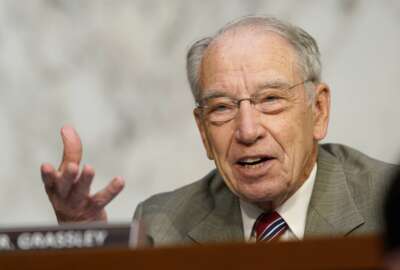Hubbard Radio Washington DC, LLC. All rights reserved. This website is not intended for users located within the European Economic Area.
On Air: Federal News Network
Trending:
Legislative changes needed to make bigger dent in improper payments
OMB controller Danny Werfel said the computer matching provisions in the Privacy Act make it harder for agencies to share information that would make stopping o...
wfedstaff | June 4, 2015 6:59 pm
The Obama administration’s focus on reducing the amount of improper payments apprears to be working. Lawmakers from both sides of the aisle and government auditors agree agencies have made progress in both decreasing the amount of money wrongly going out the door and in recovering payments that shouldn’t have been made in the first place.
But to really make a significant dent in the $100 billion problem, senior government officials told lawmakers Wednesday Congress holds the key.
Danny Werfel, the controller for the Office of Management and Budget, said Congress must change the law to let agencies more easily access two huge databases — one run by the IRS and one controlled by the Social Security Administration — to more completely stem the tide of fraud, waste and abuse. 
“There are two things with the Social Security death master file, there is a public file and there is a non-public file,” Werfel said, during a hearing of the Senate Homeland Security and Governmental Affairs Subcommittee on Federal Financial Management, Government Information, Federal Services and International Security. “Right now, we have seamless access to the public file, but it’s incomplete because there is a timing issue. We don’t always get the information from the states or whoever is required to report on the death information into our database.”
And SSA cannot give other agencies easy access to the non-public database without a complex approval process.
The law is only part of the problem
Sen. Tom Coburn (R-Okla.) said there are ways to get around this. He said agencies could send Social Security numbers to SSA and ask if the person is dead without violating the tenets of the Privacy Act. 
This problem of paying dead people isn’t new. Coburn found in 2010 agencies paid more than $1 billion to dead people between 2000 and 2010. Additionally, the Office Personnel Management’s inspector general in 2011 found the agency paid more than $600 million to the deceased over the last five years, including $113 million in 2010.
The second area where laws make it harder for agencies to share information is about which contractors or grantees are tax delinquents. Coburn said he’s not talking about those who are under investigation, but those who have been found in court to be tax delinquent.
Werfel said OMB is developing guidance for agencies about contractors or grantees who owe back taxes.
“There actually is legislation that was enacted in the 2011 appropriations bill which requires us to essentially trigger an accelerated suspension and debarment proceedings for those entities who are in arrears,” he said. “The big challenge we have (is) we do not have the ability to share the IRS data in terms of who is delinquent with the agencies so they know. We rely, believe it or not, on the contractors to tell us if they are tax delinquent.”
Coburn’s response to that requirement was a simple question, “Anyone here think that’s stupid?”
But like SSA, he said agencies could ask the IRS a simple question using a taxpayer’s identification number to find out whether the vendor or grantee owes back taxes.
“There is nothing in the law that precludes you from doing that,” he said. “And if it’s in arrears, why in the world would we be sending someone a check that owes us money?”
Werfel said there may be other reasons why using the tax identification number would not work. He said he’d have to check the tax code to see if there were prohibitions about against sharing certain kinds of information.
History of paying tax delinquent contractors
Again, tax delinquent contractors have been a long standing problem. The Government Accountability Office found in July stimulus contractors owed $757 million in back taxes. In 2008, GAO found that IRS’ records showed that more than 1.6 million businesses owed more than $58 billion in unpaid payroll taxes, including interest and penalties.
OMB also issued a memo in February 2010 asking agencies to detail their policies and procedures to ensure they don’t pay contractors who owe the government money.
And Coburn said his office soon will release yet another report by GAO detailing how much money contractors who are tax delinquents received from agencies.
Coburn and Sen. Tom Carper (D-Del.), subcommittee chairman, asked Werfel and the other witnesses for suggestions on what laws needed to be fixed.
Carper also is sponsoring the Improper Payments Elimination and Recovery Improvement Act (S 1409) as a follow on to the Improper Payments Elimination and Recovery Act (IPERA) of 2011. 
The bill is far from a done deal so Carper is working with Coburn and other subcommittee members to go down another route to fix these problems.
“Sen. Coburn and I were talking earlier this week about whether or not we might want to package together some legislation like this, our FAST Act, which deals with trying to really go after lot of problems we have with waste in Medicaid and Medicare, maybe package that together with some of the stuff we’ve worked on with surplus properties,” Carper said. “Three or four bills like that and we would put them all together and move them as a package.”
Carper added the conversations are just in the early stages so he’s not sure how the idea of packaging bills will play out.
More oversight of grantees coming
In the meantime, Werfel said OMB is working with agencies to increase their oversight over grantees. He said agencies will start using recovery auditors to review money sent to grantees.
“The agencies are still struggling to figure exactly how to operationalize deploying recovery auditors into the field to grantees, the states, the local governments and the universities,” he said. “Exactly how to look at the data and deploy the resources effectively is not something we have a lot of experience with so there is a learning curve there. In addition, this is not part of the deal the grantee community bargained for in terms of having this additional audit layer. This doesn’t mean we can’t get it done, …but it’s requiring some leg work and calibration to figure out how exactly to do it.”
The Department of Health and Human Services and Medicaid are the first out of the gate in auditing grantees. A provision in the Affordable Care Act required the Centers for Medicare and Medicaid Services to issue regulations to expand recovery auditing to grantees. Werfel said Medicaid just started recovery auditing around grants in January.
RELATED STORIES:
How agencies cut $18B in improper payments
OPM paying $600 million to dead people
GAO: Stimulus contractors owe millions in back taxes
Tax delinquent contractors focus of OFPP effort
Contractor Crackdown: tax cheats targeted by White House
Copyright © 2024 Federal News Network. All rights reserved. This website is not intended for users located within the European Economic Area.
Jason Miller
Jason Miller is executive editor of Federal News Network and directs news coverage on the people, policy and programs of the federal government.
Follow @jmillerWFED
Related Topics





